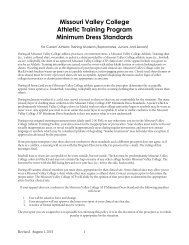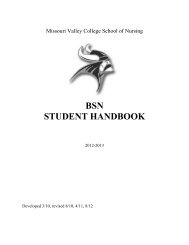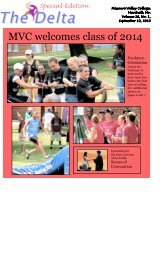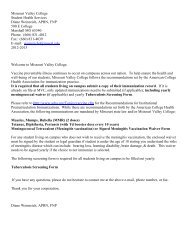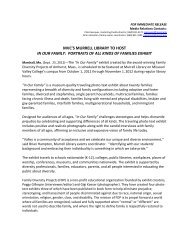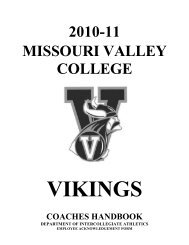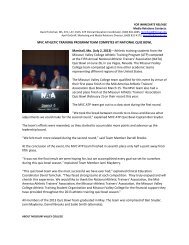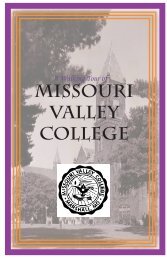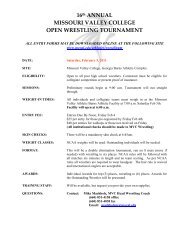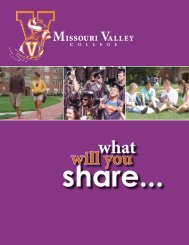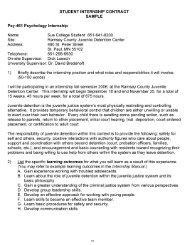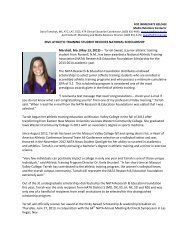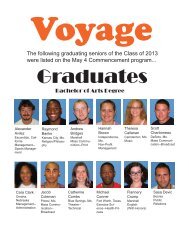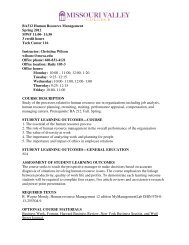April 30, 2010 - Missouri Valley College
April 30, 2010 - Missouri Valley College
April 30, 2010 - Missouri Valley College
You also want an ePaper? Increase the reach of your titles
YUMPU automatically turns print PDFs into web optimized ePapers that Google loves.
Page 10<br />
The Delta<br />
NEWS<br />
<strong>April</strong> <strong>30</strong>, <strong>2010</strong><br />
More about Maastricht Institute<br />
Sports icon says ideas need passion, perseverance<br />
(Continued from previous page)<br />
Jay Sebben, principal for Fulton Bridge Partners<br />
of Chicago, a boutique merchant bank, said though<br />
there are about 7.7 million businesses in America<br />
now, it’s tough to be an entrepreneur and to be successful<br />
in business.<br />
He advised students to take their accounting classes<br />
seriously. “You’re going to have low points, but<br />
it does get easier,” he said about business and<br />
careers.<br />
Sebben told students to find something they are<br />
passionate about, something people want to buy,<br />
and turn it into a business.<br />
Speaking through the Skype presentation, E.J.<br />
Bodewes, lecturer of Entrepreneurship at<br />
Maastricht University in the Netherlands, said,<br />
“Live your passions.” He described entrepreneurs<br />
as people who are “innovators, challengers, disruptors,<br />
self-confident, and passionate.” He said they<br />
challenge the status quo. “Look around for problems<br />
to solve.”<br />
ESPN founder returns as speaker<br />
Allison Student<br />
Delta Contributor<br />
He sought opportunities, and would work toward a<br />
big dream. He wanted to be in radio and sports, and<br />
that’s just what he did. He graduated from college,<br />
was in the Air Force, and had no experience in<br />
broadcasting when he sought his first radio job. And<br />
then he succeeded in cable TV beyond measure.<br />
Bill Rasmussen, the founder of ESPN and<br />
<strong>College</strong>Fanz, spoke at the Maastricht Institute of<br />
Entrepreneurship on <strong>April</strong> 21 about his road to<br />
becoming successful.<br />
Returning to MVC after his <strong>College</strong>Fanz.com covered a football game last<br />
semester, Bill Rasmussen talks about the idea and work that led to ESPN.<br />
His path to his success wasn’t as smooth as some<br />
may think. With quite a few bumps along the way,<br />
he finally reached his dream. On <strong>April</strong> 1, 1962, he<br />
had his first on-air experience with the radio.<br />
With cable just developing in America, Rasmussen<br />
wanted a sports network that was 24 hours a day.<br />
That’s when people thought he was crazy, wondering<br />
who would watch sports 24 hours a day. And his<br />
response was, “Not watch 24 hours a day, just be<br />
available 24 hours a day.” He went to the RCA in<br />
New York to talk about satellites and ended up buying<br />
a 24-hour transponder.<br />
That’s when ESPN was founded. He said it didn’t<br />
have a big audience at first.<br />
But now the sports news at<br />
6:<strong>30</strong> p.m. gets more viewers<br />
than network news.<br />
He had the audience laughing<br />
when he told a story about<br />
his advertising methods. Men<br />
wore red jackets with a big<br />
ESPN on the back and “I told<br />
them to face the field the<br />
whole game and stand right<br />
on the side lines. CBS couldn’t<br />
get a shot without ESPN<br />
being in view.”<br />
Rasmussen said, “The harder<br />
you work, the luckier you<br />
get.”<br />
Rasmussen concluded his<br />
speech, “You don’t have to<br />
know the facts to be an entrepreneur,<br />
you have to have the<br />
passion of the idea.”<br />
Bodewes said entrepreneur businesses can work<br />
for young people who don’t have a lot of money or<br />
even networks but who have big dreams and go<br />
after them. “Google is a good example of two guys<br />
who had no business experience and never worked<br />
for a company, but had a great idea,” he said,<br />
adding that the story of Microsoft is similar.<br />
He said that most people who start a business fail<br />
within the first five years, but entrepreneurs will try<br />
and try again. Perserverance is important, Bodewes<br />
said.<br />
Two master’s degree students from the<br />
Netherlands, Robert Dresen and C.A.<br />
Van Den Ende, talked about their efforts<br />
in starting a company called M5<br />
Solutions which specializes in innovative<br />
solutions to benefit the elderly. Their<br />
“Lock Aid” invention helps people to<br />
find door keyholes easier. They sold<br />
shares in company stock and explained<br />
the steps they took to promote the product<br />
and obtain bank financing.<br />
They spoke about meeting members of<br />
the MVC Rodeo team in Marshall and<br />
agreed when one rodeo cowboy<br />
described himself as an entrepreneur<br />
because of the costs, gains, time, and<br />
other aspects of the sport.<br />
TWO SPEAKERS RETURN TO<br />
CAMPUS<br />
Two of the institute speakers returned to<br />
MVC, following visits last semester.<br />
ESPN founder Bill Rasmussen and<br />
playwright Jim Henry talked about their<br />
efforts in business entrepreneurial matters.<br />
Rasmussen, who is also the founder of<br />
<strong>College</strong>Fanz.com, the world’s largest<br />
online sports community, said that in the<br />
1960s he always wanted to be in the radio<br />
business and in the sports business.<br />
Though he had no experience, he applied<br />
for a sports announcer job and got it,<br />
eventually moving on to TV sports.<br />
He came up with the idea of ESPN, the<br />
24-hour sports network, after he was<br />
fired by the company that owned the<br />
Hartford Whalers hockey team in<br />
(Continued on next page)



